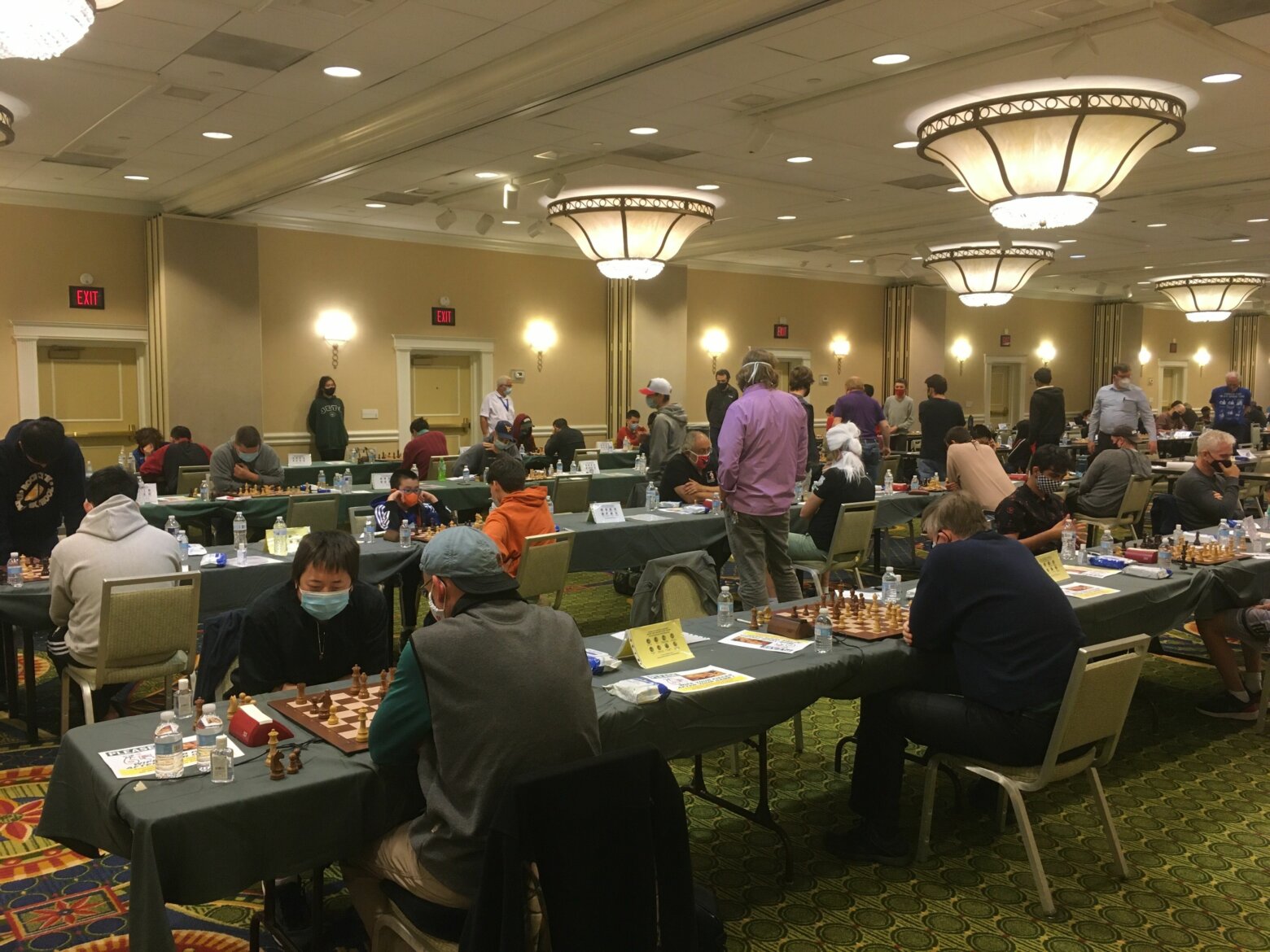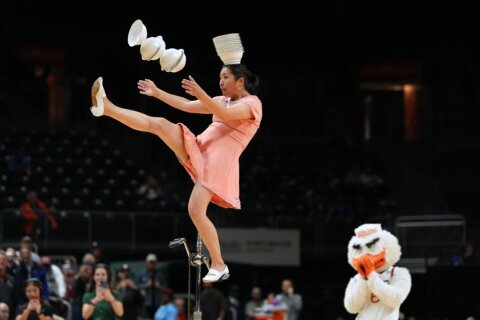
When the COVID-19 pandemic began in the U.S., some of the earliest high-profile changes in American life came in the realm of sports: In quick succession in March, the NBA and NHL suspended their seasons, while MLB delayed the start of their year, eventually playing a severely truncated season.
Though chess isn’t as high in the American consciousness as those sports, the pandemic shut the game down even more completely. With rooms full of people sitting and playing, opponents and neighboring games a couple feet from each other, for hours, it was obvious that tournament chess couldn’t continue.
It still mostly doesn’t, but last month, in Dulles, Virginia, the first face-to-face tournament in the D.C. area since March was played, as about 130 players competed in the U.S. Class Championship.
Organizer Anand Dommalapati told WTOP that the field was about half what the U.S. Class generally draws, but that “I didn’t even expect this much, considering the scary situation. But I think all the players are very cooperative, and they’re all following the protocols.”
- Sign up for WTOP alerts
- Latest coronavirus test results in DC, Maryland and Virginia
- Gas retailer accused of overcharging customers at DC gas stations
- ‘Time to hunker down’: Md. counties tighten COVID-19 restrictions amid surge
- Bowser concerned DC not being ‘vigilant’ as COVID cases rise; new restrictions possible
Looking for more information? D.C., Maryland and Virginia are each releasing more data every day. Visit their official sites here: Virginia | Maryland | D.C.
Dommalapati considered the risks — each player had to sign a waiver. But the appeal of the game outweighed the other factors, including for his teenage daughter, a tournament player whose interest in chess got him into organizing tournaments in the first place.
He said his daughter was getting tired of playing online, “just because they sit at the computer screen for a long time. And she was OK during the summer, but once school started, they’re already on the screen for six hours, seven hours.”
Then comes homework, which is several more hours. “Then she gets tired of screen time. She said, ‘No; I don’t want to play online chess — it’s just so boring.’ I think that made me think, ‘OK, now it’s an opportunity.”
Safety measures
Masks were required; spectators were banned. Boards were placed much farther apart than usual. After each game, players paused to wipe off the pieces.
Dommalapati and his staff sprayed each board and set, and the hotel staff came through and cleaned the room after all games were finished in each round.
Players had to leave the hotel after their games, unless they were guests of the hotel, in which case they had to go to their rooms.
At one point, a rules dispute broke out, and chief tournament director Rudy Abate, of Henderson, North Carolina, had to break up a group of players who had gravitated toward the argument. Still, he agreed, “the players are very cooperative.”
When traditional activities had to shut down in person, many of them moved online. In some ways, chess was perfectly suited for that transition. Many people play online already, and the game doesn’t lose much in translation: You can’t face a split-fingered fastball online, but a virtual Knight moving from c6 to d4 makes you think as hard as a wooden one.
Indeed, online-only enterprises such as the PRO Chess League and the Magnus Grand Prix (organized by Norwegian world champion Magnus Carlsen) have stepped into the gap. The U.S. Championship, as well as the Olympiad (the world team championship), were played online.
Chess-related livestreams on platforms such as Twitch have garnered millions of fans, and made substantial money for talented streamers, such as former U.S. Champion Hikaru Nakamura.
It raises the question: The longer the pandemic goes on, and the more players get used to playing online, will they come back to over-the-board chess? Will chess become a video game, albeit a high-class one?
“It’s possible,” Abate said. Dommalapati added that he knows of players who have only played online.
But for most of the players and officials at the U.S. Class, the real-world game was here to stay.
‘Changed the nature’
Michael Hoffpauir, the president of the U.S. Chess Federation and the executive secretary and treasurer of the Virginia Chess Federation, said the pandemic, and the move online, has “definitely changed the nature” of the game.
He’s not worried that online chess will supplant the old-school game. For one thing, while technological vigilance is better than ever, it can’t be known for sure whether your opponent on the other end of the internet is consulting with a world-class computer program to come up with their moves.
“You have a camp who enjoy the online chess because they can continue to compete,” Hoffpauir said. “But there’s another segment who just have gotten some sour taste because of cheating incidents in online tournaments. Those types of incidents definitely spoil the reputation of online play.”
Hoffpauir added that live chess has an element the virtual game can’t touch: “The social interaction — it’s just not the same as playing over the board.”
He added, “It’s just a different experience over the board. When you’re sweating because you just [lost] a piece, or you’re in a bad position, or your King’s defense is compromised, you sweat, and your opponent can see it and feel it.”
Chess is, in its own quiet, possibly weird way, a very social game, but at the U.S. Class, so much of that social quality seemed lost to the safety measures. All that was left was the game itself.
Still, the question arises: Given the risks of the coronavirus, is chess that important?
“Yeah,” Abate said; “it is.”
‘Sitting on my hands’
The players surely agreed. Virginia’s Jennifer Yu, 18, won the 2019 U.S. Women’s Championship and played in the U.S. Class the day after finishing fourth in this year’s online women’s event.
She wrote for Chess Life that playing in a mask made only an “insignificant” difference. “After years of leaning on my hand, however, I was more worried about touching my face. But I broke the habit early — by sitting on my hands!”
The big adjustment, she wrote, was playing with “three-dimensional pieces” again, and simply being around so many people at once — both completely commonplace happenings that had become strange very quickly.
Shelev Oberoi, 14, of Texas, came to Dulles for the chance to play stronger players than he’s used to, and told WTOP that he hoped “the people who were introduced to chess online will return to go to a tournament in person.”
He added that the appeal was “hard to explain, but it’s just the feeling of the board versus the screen.”
And while 6-year-old Tariq Yue, of Pennsylvania, started playing online, and has played about 30 online tournaments, he was hooked on the face-to-face game in only his second over-the-board tournament.
“You look at the pieces differently,” Yue said. “You see them differently.”






